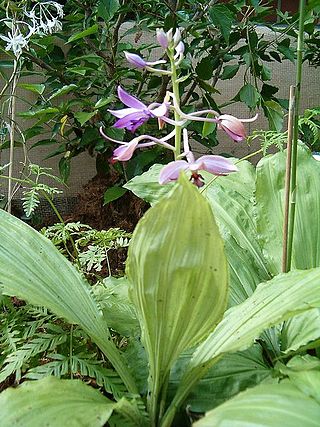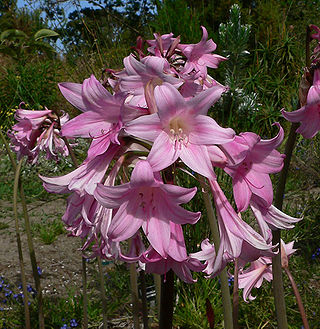
The flowering plant genus Ipheion belongs to Allioideae, a subfamily of the family Amaryllidaceae. It includes three species native to southern Brazil, northeastern Argentina, and Uruguay.

Nothoscordum is a genus of New World plants in the onion tribe within the Amaryllis family. It is probably paraphyletic. The genus is native to North, Central and South America, though a few species have become naturalized in various parts of the Old World.

Brodiaeoideae are a monocot subfamily of flowering plants in the family Asparagaceae, order Asparagales. They have been treated as a separate family, Themidaceae. They are native to Central America and western North America, from British Columbia to Guatemala. The name of the subfamily is based on the type genus Brodiaea.

Calanthe, commonly known as Christmas orchids, is a genus of about 220 species of orchids in the family Orchidaceae. They are evergreen or deciduous terrestrial plants with thick roots, small oval pseudobulbs, large corrugated leaves and upright, sometimes arching flowering stems. The sepals and petals are narrow and a similar size to each other and the labellum usually has spreading lobes.

Olsynium is a genus of summer-dormant rhizomatous perennial flowering plants in the iris family Iridaceae, native to sunny hillsides in South America and western North America.

Leucocoryne(glory-of-the-sun) is a genus of bulbous perennial plants in the family Amaryllidaceae. The foliage of all species is long and narrow and has an onion-like scent. The blue, white or lilac flowers are held in umbels.

John Miers, FRS FLS, knight grand cross of the Order of the Rose, was a British botanist and engineer, best known for his work on the flora of Chile and Argentina.

Laxmannia is a genus of tufted perennial herbs in the family Asparagaceae, subfamily Lomandroideae, that are endemic to Australia.

Rhodophiala was a genus of herbaceous, perennial and bulbous plants in the Amaryllis family. It consisted of about 30 South American species distributed in southern Brazil, Argentina, and, specially, in Chile. Most of the species are known colloquially as añañuca. It has now been submerged in Zephyranthes.

The Amaryllidaceae are a family of herbaceous, mainly perennial and bulbous flowering plants in the monocot order Asparagales. The family takes its name from the genus Amaryllis and is commonly known as the amaryllis family. The leaves are usually linear, and the flowers are usually bisexual and symmetrical, arranged in umbels on the stem. The petals and sepals are undifferentiated as tepals, which may be fused at the base into a floral tube. Some also display a corona. Allyl sulfide compounds produce the characteristic odour of the onion subfamily (Allioideae).
Pierfelice Ravenna (1938–2022) was a Chilean botanist of Italian Jewish origin. His research interests were mainly in the field of South American Amaryllidaceae.

Phycella is a genus of herbaceous, perennial bulbous flowering plants belonging to the family Amaryllidaceae, subfamily Amaryllidoideae. The genus consists of five species distributed from central Chile to northwestern Argentina.

Tristagma is a genus of South American plants in the onion subfamily with the Amaryllis family. It includes 17 species native to Peru, Argentina, and Chile in South America.

Solaria is a genus of South American plants in the family Amaryllidaceae, subfamily Allioideae, tribe Gilliesieae, native to Chile and Argentina. Kew treats Solaria as a synonym of Gilliesia.

Miersia is a plant genus in the Amaryllidaceae. The genus has 10 known species, 9 of which are endemic to Chile and one, M. rusbyi, endemic to Bolivia.

Gilliesieae is a tribe of herbaceous geophyte plants belonging to the subfamily Allioideae of the Amaryllis family (Amaryllidaceae). Described in 1826, it contains fifteen genera and about eighty species. It has been variously treated as a subfamily or tribe. It is native to the Southern United States, Central and South America, predominantly Chile. Of the three tribes of genera that make up the subfamily Allioideae, Gilliesieae is the largest and most variable. The tribe was divided into two tribes in 2014, Gilliesiae s.s. and Leucocoryneae, based on differences in floral symmetry and septal nectaries.
Erinna is a genus of perennial herbaceous geophytes in the flowering plant family Amaryllidaceae. It is native to Chile, South America. It is included in the tribe Gilliesieae, within the subfamily Allioideae. The genus is monotypic, with a single species, Erinna gilliesioides. It is relatively rare.

Allioideae is a subfamily of monocot flowering plants in the family Amaryllidaceae, order Asparagales. It was formerly treated as a separate family, Alliaceae. The subfamily name is derived from the generic name of the type genus, Allium. It is composed of about 18 genera.

Famatina was a small genus of South American bulbous plants identified by the Chilean botanist Ravenna in 1972. Five species have been described. Molecular phylogenetic studies suggested the genus was polyphyletic, and species have been moved to other genera.
















